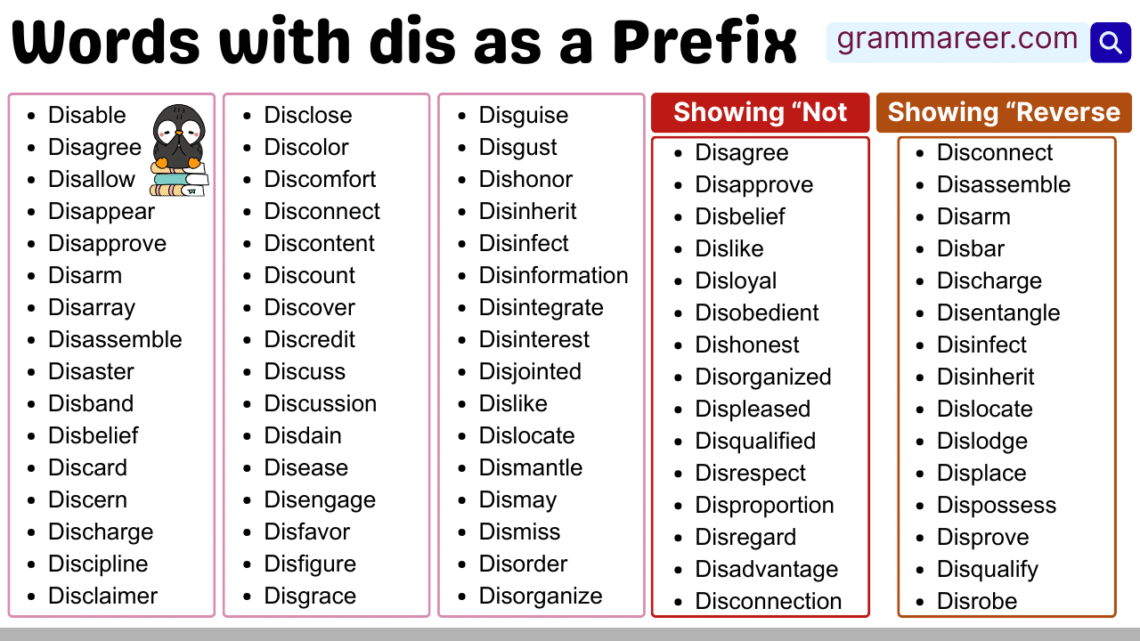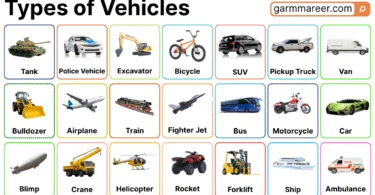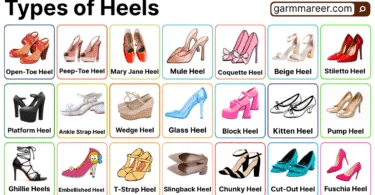Many English learners often struggle when they see words like disagree, disconnect, or disable. They know the base word, but the prefix dis- suddenly changes its meaning and causes confusion. This problem makes reading harder, test scores lower, and writing less clear. This blog post explains the meaning, rules, and usage of the prefix dis-, with lists of common words and practice sentences to build your confidence.
Table of Contents
Meaning and Function of the Prefix dis-
The prefix dis- comes from Latin and is used widely in English. It usually changes the meaning of a word into:
- Not / Opposite of → creates a negative meaning (disagree = not agree).
- Reverse / Remove → shows the action of undoing or taking away (disconnect = remove connection).
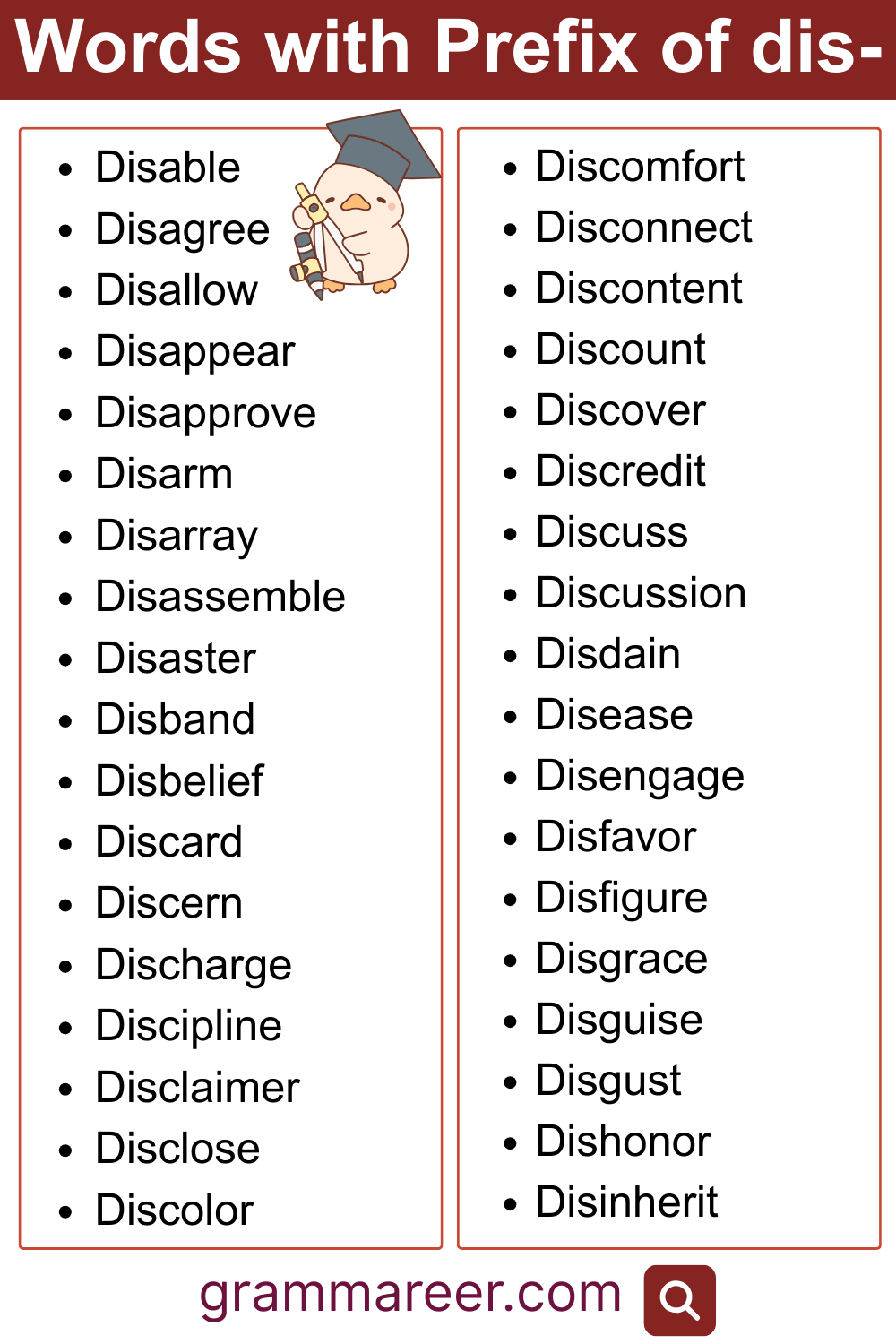
List of Common Words with the Prefix dis-
The prefix dis- is very common in English vocabulary. Below are maximum lists of words grouped by their two main functions.
- Disable
- Disagree
- Disallow
- Disappear
- Disapprove
- Disarm
- Disarray
- Disassemble
- Disaster
- Disband
- Disbelief
- Discard
- Discern
- Discharge
- Discipline
- Disclaimer
- Disclose
- Discolor
- Discomfort
- Disconnect
- Discontent
- Discount
- Discover
- Discredit
- Discuss
- Discussion
- Disdain
- Disease
- Disengage
- Disfavor
- Disfigure
- Disgrace
- Disguise
- Disgust
- Dishonor
- Disinherit
- Disinfect
- Disinformation
- Disintegrate
- Disinterest
- Disjointed
- Dislike
- Dislocate
- Dismantle
- Dismay
- Dismiss
- Disorder
- Disorganize
- Disorient
- Disown
- Disparage
- Displace
- Display
- Displease
- Disposable
- Disposal
- Dispose
- Disproportion
- Disprove
- Dispute
- Disqualify
- Disregard
- Disrepair
- Disrespect
- Disrupt
- Dissatisfy
- Disseminate
- Dissension
- Dissent
- Dissertation
- Dissident
- Dissipate
- Dissolve
- Dissonance
- Dissuade
- Distance
- Distill
- Distinct
- Distinguish
- Distract
- Distress
- Distribute
- District
- Distrust
- Disturb
- Disunity
- Disuse
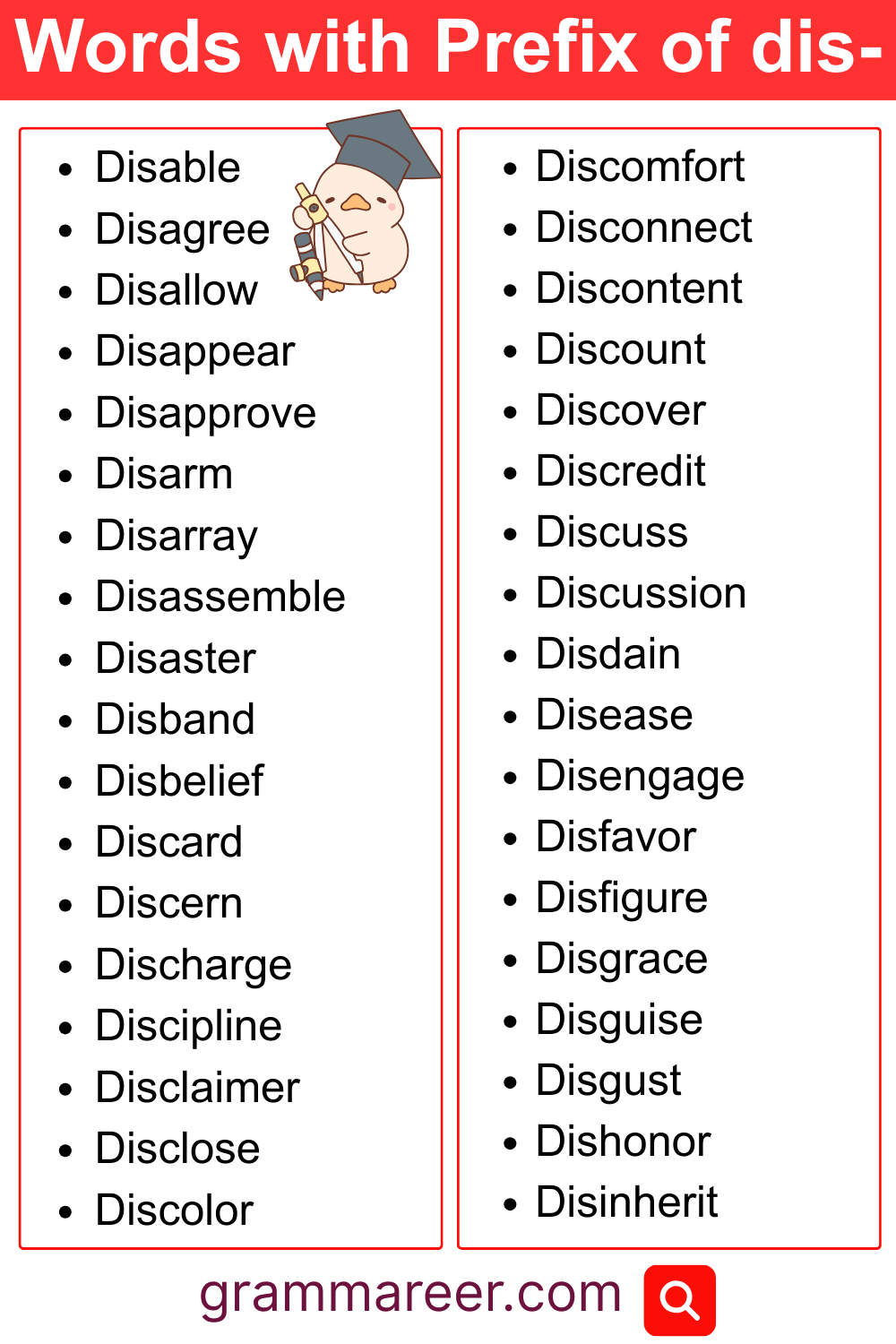
Words with Prefix dis- (Showing “Not / Opposite of”)
Here are words where dis- means not or opposite of:
- Disagree
- Disapprove
- Disbelief
- Dislike
- Disloyal
- Disobedient
- Dishonest
- Disorganized
- Displeased
- Disqualified
- Disrespect
- Disproportion
- Disregard
- Disadvantage
- Disconnection
- Disengage
- Disinterest
- Disown
- Disservice
- Discontent
- Disbelief
- Disfavor
- Disgrace
- Disinclined
- Disparity
- Disprove
- Discredit
- Disunity
- Disvalue
- Disrepute
- Disgust
- Dishearten
Words with Prefix dis- (Showing “Reverse / Remove”)
Here are words where dis- means reverse or remove:
- Disconnect
- Disassemble
- Disarm
- Disbar
- Discharge
- Disentangle
- Disinfect
- Disinherit
- Dislocate
- Dislodge
- Displace
- Dispossess
- Disprove
- Disqualify
- Disrobe
- Dissect
- Dissolve
- Dismantle
- Discontinue
- Disband
- Disallow
- Disapprove
- Discard
- Dispel
- Dispense
- Disperse
- Distract
- Disturb
- Disuse
- Disfigure
- Disable
Practice Sentences Using Prefix dis-
Here are 30 practice sentences with words containing the prefix dis-. The main prefix word is in bold.
- Ali did not disagree with his teacher’s advice.
- The coach showed his anger when the players were disobedient.
- She felt displeased with the final result.
- Ahmad was punished for being dishonest in the test.
- The workers will disassemble the old machine.
- The virus can be killed if you disinfect the surface.
- The students were disorganized during the event.
- He decided to disconnect the power supply.
- The politician was disqualified after breaking rules.
- The neighbors showed disrespect to the community.
- Sara felt discontent when she didn’t win the prize.
- The soldiers had to disarm the enemy.
- The school will discontinue the old program.
- He had to disband his team after the failure.
- The judge will disbar the lawyer for misconduct.
- The villagers tried to dislodge the stone from the road.
- The medicine will help to dissolve the tablet in water.
- The students felt disheartened by the low scores.
- The teacher will disprove the false rumor.
- She had to disrobe before the medical test.
- I had to discard the broken chair.
- The child showed disinterest in sports.
- He had to dislocate his arm in the accident.
- The teacher told them not to disturb the class.
- The manager had to displace the workers.
- The scientist will dissect the sample under a microscope.
- The smoke will disperse into the air.
- The fans felt disgrace after the scandal.
- She will disinherit her son for his actions.
- The car accident left him disabled.
FAQs about Words that Have dis as a Prefix
The prefix dis- usually means “not, opposite of” or “reverse, remove.” For example, disagree = not agree, disconnect = remove connection.
If a word begins with dis- and changes the base meaning to negative or opposite, it uses this prefix. Example: dishonest = not honest.
Yes, most of the time. Words with dis- generally show negativity, reversal, or removal.
No, not every word can take dis-. It is used with specific words that make sense in English (e.g., disagree, but not disrun).
Common words are disagree, disconnect, or disable
You May Also Like

